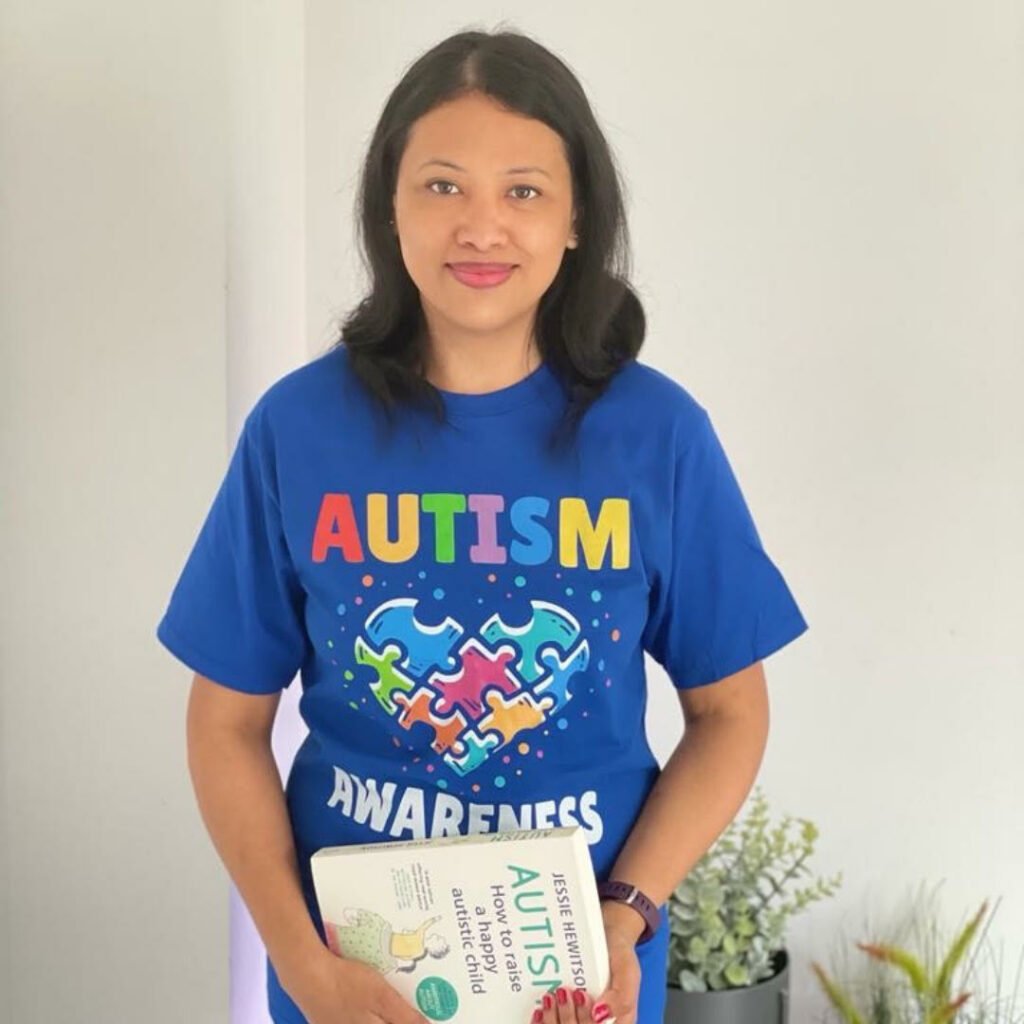Celebrating Neurodiversity: Minakshi Koch, An Exceptional Mother to An Extraordinary Child

The journey of motherhood is an incredible and complex experience, filled with moments of joy, heartache, and boundless love. When a mother is blessed with an extraordinary child who has neurological differences, her path takes on an added layer of complexity and depth. These exceptional mothers, who dedicate themselves to nurturing and supporting their children, deserve our utmost admiration and respect.
The unwavering love and strength of a mother are universally celebrated, but there are exceptional mothers who rise above and beyond in their dedication to raising extraordinary children gifted with neurological differences. These remarkable women navigate a complex and often challenging world, advocating for their children’s needs and celebrating their unique strengths.
These mothers are often faced with a myriad of challenges, from navigating the complexities of medical and educational systems to advocating for their child’s rights and accommodations. They must learn to strike a delicate balance between providing guidance and fostering independence, ensuring that their child is equipped to navigate the world on their terms. In the face of adversity, these mothers demonstrate an incredible resilience and strength, drawing from an endless well of love and determination.
In this article we explore the inspiring life of Minakshi, an exceptional mother to an extraordinary child, exploring her resilience, love and determination. Drawing from the latest statistics and news on neurodiversity, we will shed light on the need to increase awareness on neurological differences in society and emphasize the vital role these exceptional mothers play in fostering a more inclusive, compassionate, and diverse world.

Table of Contents
Neurodiversity- the impact on mother’s personal life and professional career
The media holds significant power in molding public opinion and comprehension of a multitude of issues, encompassing the realm of neurodiversity. Despite strides made in recent times, the media often remains captivated by sensationalist narratives and attention-grabbing headlines. Consequently, the deeply human aspects of neurodiversity, characterized by tremendous challenges, unwavering determination, and heartfelt affection, are often overshadowed and neglected.
The impact of neurodiversity on a personal life and professional career can be profound, often shaping their experiences, relationships, and accomplishments in ways that are both challenging and enriching. Embracing neurological differences and understanding the unique strengths and challenges that come with them can lead to a journey of growth and self-awareness.
Neurodiversity can influence the way people communicate, process emotions and build connections with others. By understanding and embracing their unique ways of relating, people with neurological differences can foster deep, meaningful relationships based on mutual understanding, respect and acceptance.
Acknowledging neurological differences can lead to a greater understanding of yourself, including strengths, challenges and unique ways of thinking. This self-awareness can be empowering, as it allows individuals to advocate for their needs and celebrate their distinct qualities.
Neurodiversity may require individuals to develop unique coping strategies to navigate everyday life, such as creating routines, utilizing assistive technology, or seeking therapeutic support. These strategies can enhance overall well-being and quality of life.
Facing challenges associated with neurological differences can cultivate resilience and perseverance. Overcoming obstacles and learning to adapt to various situations can lead to personal growth and a stronger sense of self.
In professional career the influence of neurodiversity can be significant, frequently moulding their encounters, connections, and achievements through a blend of demanding and rewarding experiences.
- Diverse skill sets: Neurological differences can contribute to unique strengths and abilities in the workplace, such as creativity, problem-solving, attention to detail, or the ability to think “outside the box.” These diverse skill sets can be invaluable assets in various professional fields.
- Adaptability: Individuals with neurological differences often have a heightened ability to adapt to new situations, as they have spent their lives navigating a world not always designed with their needs in mind. This adaptability can be a valuable trait in today’s rapidly changing work environment.
- Empathy and understanding: Experiencing first-hand the challenges and triumphs associated with neurodiversity can lead to increased empathy and understanding for others, which can be an essential quality in team settings and leadership roles.
- Advocacy and inclusion: Understanding and embracing one’s neurological differences can inspire individuals to become advocates for neurodiversity in the workplace. By promoting inclusive practices, they can help create a more diverse and accepting work environment.
The influence of neurodiversity on personal life and professional career can be both challenging and rewarding. By embracing their unique strengths and challenges, individuals with neurological differences can experience a journey of growth, self-discovery, and success, ultimately enriching their lives and contributing to a more inclusive, diverse, and compassionate society.

Minakshi Koch- an exceptional mother raising an extraordinary child
For mothers of neurodivergent children, the influence of neurodiversity on their personal lives and professional careers can be profound, shaping their experiences and growth as they navigate the complexities of raising and supporting their extraordinary children. When asked how neurodiversity has influenced her personal life and professional career, Minakshi said:
“I first started working as a researcher for Metabolic diseases. My MPhil topic for research was Food allergies and autism. I worked as a researcher for 6 years and then decided to take a break. Little did I know that just a few years later I would have an autistic child of my own. It was only when he turned 2 that I was completely certain about it. It was almost like I was destined to keep working in this field. I got back into writing about autism and that was the turning point. I am now an author and Chief Editor of the prestigious IGC Magazine.“
Minakshi shared how neurodiversity has positively impacted her life, career and relationships.
” Having a neurodiverse child changes everything. Nothing that you have learned or lived so far applies. It is not just the child but the whole family who has to learn to live and love in an atypical way. It is an ocean of knowledge which you need to endure if you want to know your neurodiverse child. People who do not or cannot learn their way can never get into their world or have a real relationship. I have completely changed from being a judgmental individual to an openminded one. I have learned to love unconditionally and what it is to sacrifice everything for your child’s welfare.

In addition to her steadfast advocacy, Minakshi also keenly attuned to her child’s emotional needs. She understands that her child is more sensitive to stress, prone to anxiety and take care to create a nurturing and supportive environment where her child can feel safe and understood. She celebrates her child’s victories, no matter how small, and provide comfort during difficult moments.
“I have learned to fight not only for myself and my child but for the whole community. I have met lots of people and learned a lot and am still learning. I am now surrounded by only those who are genuine and accept me and my family as we are. I am grateful that God selected me over so many to take the role of being an exceptional mother to an extraordinary child. I say this to all autism mothers. Our journey is like none other. “
The bond between an exceptional mother and her extraordinary child is a testament to the power of unconditional love. Through her love, Minakshi teaches her child about self-acceptance, perseverance, and empathy, instilling values that will serve them well throughout their lives. She helps her child to see the beauty in their differences and to embrace their unique strengths and abilities, fostering a sense of self-worth and confidence that is truly priceless.

The reality of raising a neurodiverse child
In the intricate and often misunderstood realm of neurodiversity, the challenges faced by mothers raising neurodiverse children can be both emotionally and physically taxing. Every day, these mothers navigate a world that is not always accommodating to their child’s unique needs while striving to provide the best possible support and environment for their children to thrive.
The journey often begins with the complex process of obtaining an accurate diagnosis for their child, which can be time-consuming and emotionally draining. Once the diagnosis is established, these dedicated mothers must advocate for access to appropriate educational, therapeutic, and social resources for their children. According to a study conducted by the American Psychological Association, mothers of children with autism, for instance, can experience stress levels similar to those of combat soldiers, with up to 40% of these mothers experiencing symptoms of Post-Traumatic Stress Disorder.

Social inclusion- a mother’s daily battle for her extraordinary child
Social inclusion during childhood plays a vital role in a child’s academic, social, and emotional development. However, neurodiverse children often face challenges when it comes to social acceptance in school settings. Interestingly, children attending smaller, more rural schools tend to experience greater social cohesion.
In light of this observation, a recent study investigated whether neurodiverse children, particularly those with autism or specific learning difficulties, experience improved social integration in smaller, rural schools. The study analyzed data from 2,225 Irish primary school children, including 84 children with specific learning difficulties and 53 autistic children. The findings indicate that neurodiverse children in smaller schools enjoy enhanced social integration, regardless of the school’s location. However, the level of integration varied depending on whether the children had specific learning difficulties or were autistic.
These results send a powerful message to policymakers and educators, emphasizing the significance of school size in promoting social acceptance for neurodiverse learners. By considering these findings, they can make more informed decisions when it comes to creating inclusive and supportive learning environments for all students.
One of the most profound challenges faced by mothers of neurodiverse children is ensuring their child’s social inclusion and acceptance. They work tirelessly to educate others about their child’s unique needs and strengths, fostering a sense of understanding and empathy within their community. At the same time, they must manage their own emotions and stress levels while also supporting their child’s emotional growth and resilience. A study published in the Journal of Autism and Developmental Disorders found that mothers of children with autism have a 34% higher chance of developing depression compared to mothers of neurotypical children, highlighting the emotional toll of raising a neurodiverse child.
Balancing the family dynamics is another aspect that these mothers must consider, as they strive to ensure that each child in the family feels valued and supported. Moreover, raising a neurodiverse child often comes with significant financial considerations, such as the costs of specialized therapies, educational resources, and support services. Mothers must navigate these expenses while maintaining their family’s financial stability.
Despite the myriad of challenges, the journey of raising a neurodiverse child can also be incredibly rewarding and enriching. As they witness their child’s growth, resilience, and unique contributions to the world, mothers themselves grow as individuals, learning invaluable lessons in empathy, patience, and love. Through the challenges and triumphs, the journey of raising a neurodiverse child becomes a transformative experience, ultimately strengthening the bonds of love and understanding within the family.
We asked what are the challenges Minakshi had faced and the strategies she used to overcome them.
I have read a lot of books and journals on autism. I have never cared about success or failure, but worked on it with complete determination and dedication. I have tried to reach out to as many parents as possible to get tips on what works well for them. Raising an autistic child is not easy. In fact raising any child is difficult. But when it comes to a neurodiverse child, it is more about educating yourself to think like them rather than trying to make them think and behave like you.
This is a huge challenge because we have lived a neurotypical life forever and that is what comes to us naturally. However, books written by autistic adults are very useful as they can tell what worked best for them and how they feel in various situations. “
When we asked what are her tips and advice for other professionals caring for neurodivergent family members, particularly mothers to neurodivergent children, Minakshi told us:
“To mothers I would say, take one day at a time and be very patient. We are not in a race. We have to concentrate on our child’s welfare and happiness before anything else. Do not care about what people say or think as you are the one who is enduring it all. Take care of yourself as well and do not get on a guilt trip. You are the best for your child. No one can do half of what you do for your child.
To professionals who do not have an autistic child but are working around a neurodivergent family, please learn more and more about autism and its challenges. You shall then be able to understand the difficulties our families face on a day to day basis. Please advocate for autistic children and their families. It is very difficult to get through this alone.”
The influence of neurodiversity on personal life and professional career can be both challenging and rewarding. By embracing their unique strengths and challenges, exceptional mothers like Minakshi learn to challenge the status quo and allow neurological differences become a journey of unconditional love, self-discovery and success. Enriching her community with her love and determination, Minakshi makes a massive contribution to a more inclusive, diverse and compassionate society.
In the complex world of neurodiversity, Minakshi Koch embodies the ideal fusion of passion, commitment, empathy, and proficiency that countless mothers worldwide strive to achieve. With an impressive academic background, including an MPhil degree in Biochemistry and a Postgraduate Diploma in Clinical Research and Clinical Data Management, this remarkable mother has made substantial contributions to the local community through numerous publications in national and international journals.
The Vice CEO of BHI Homes and KIA Beauty, Minakshi is driven by a passionate, unwavering commitment to making a difference in the lives of those with autism and dedicates her time and energy to raising awareness and promoting inclusion. As the Chief Editor of Ishkama Global Change Magazine, her influence reaches far and wide, touching the hearts and minds of countless mothers across the globe.
If you want to share your story and inspire our readers with your passion and expertise, know that every story is paving the way for a brighter, more inclusive future.





